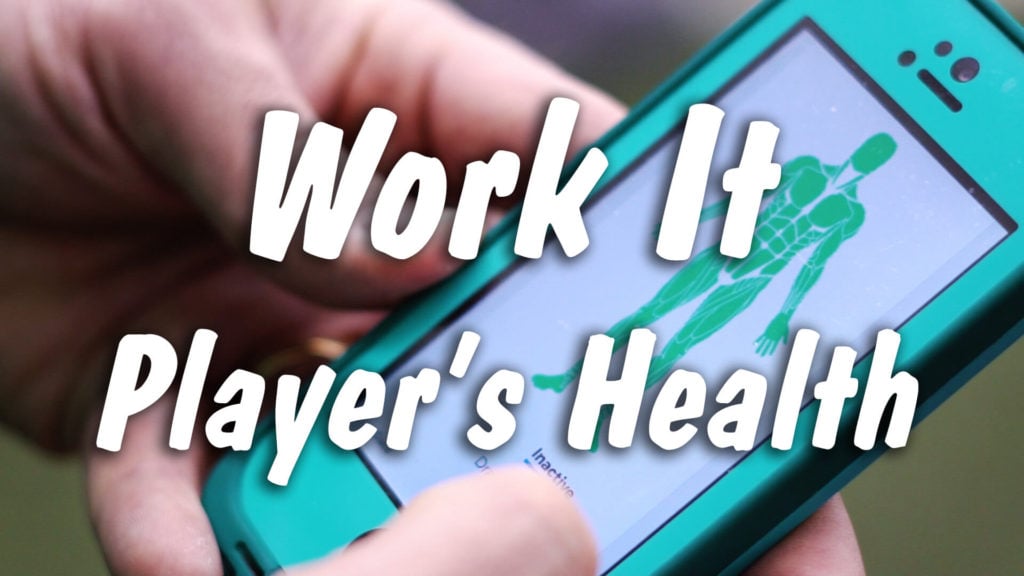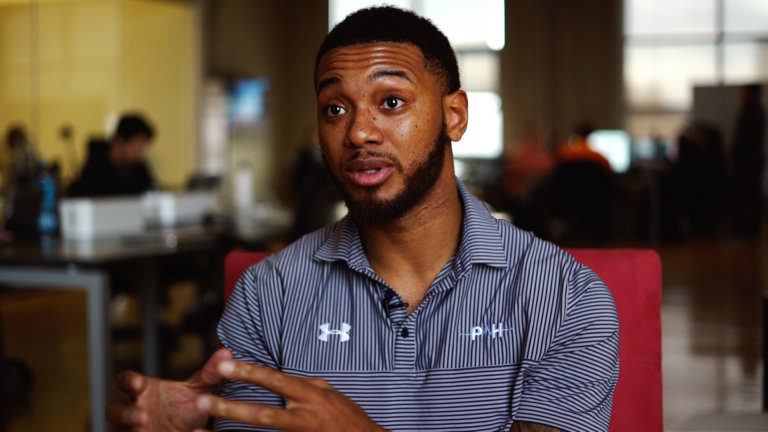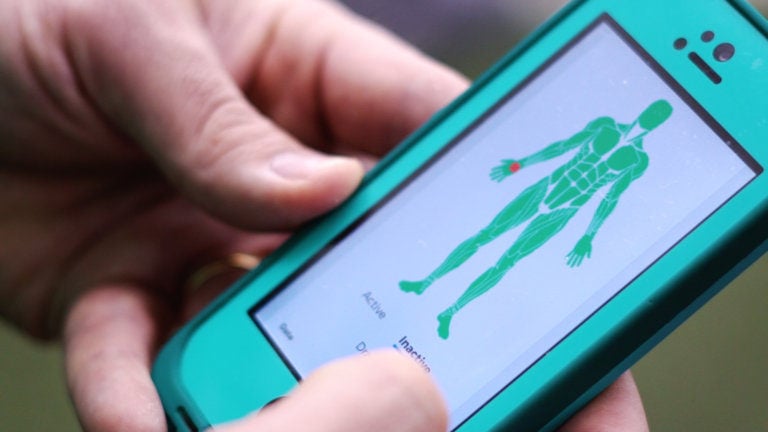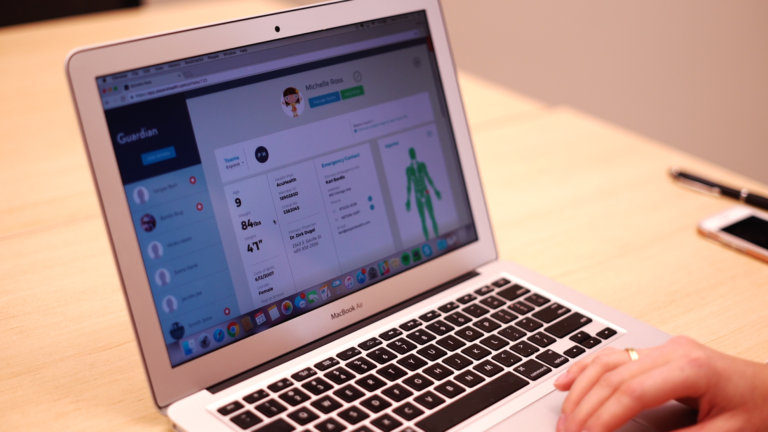
By Katie Moritz
When Tyrre Burks was playing football at the age of 15, he was hit hard with his head down. The impact knocked him to the ground and caused a life-altering health scare.
“I was paralyzed on the turf for about 30, 45 minutes—couldn’t move—and then miraculously everything started to come back,” he said. “I got up, walked off, my coach was like, ‘Hey, I think you have a stinger, you’re fine.’
A year later I had the exact same injury happen to me. Come to find out I had three bulging discs in my neck. I had been playing with that condition for an entire year.”

Fast-forward and Burks is a professional football player for the Saskatchewan Roughriders. After being injured four times in one season, he decided to develop a smartphone app—Player’s Health—to help parents of young athletes take control of their children’s sports health. He doesn’t want childhood sports injuries to go misdiagnosed or ignored, as his did.
“That (first) injury led to lower back injuries, hamstring injuries, and ultimately led to the end of my career,” he said.
“Most kids, they just want to play. When they get hurt, they’ll do anything to get back on that field again. I just want to make sure that they have the best resources… so that we can make the best decisions on how we get them back on the field.”
Rewire: What need did you think Player’s Health could meet?
Tyrre Burks: It was really about mismanagement of injuries. These coaches that are not medical professionals are making decisions about (young athletes’) health and we want to focus on making sure that that doesn’t take place. My coach, God bless his heart, he was making the best decision based on what he knows. We want to make sure that the people that care the most, their parents, and then the medical professionals that are trained to care about these kids’ health, are making those decisions and not the coach.
Rewire: How did you get the company started?
TB: Starting Player’s Health was a lot easier than most. … I had some capital that I had saved up and then my sports agent, when I told him that I wasn’t going to play football anymore, he thought I was insane. “You’re 24, you want to stop playing ball, you want to go start this idea?” And when I told him the idea he was my first investor. He matched me dollar for dollar on what I contributed… and that got me off and going. I saw that someone outside of myself saw the need for what I wanted to create and that’s how we really got going.

Rewire: Who’s on the Player’s Health team?
TB: I’m biased but I feel like we have the best team working on Player’s Health. Because we all literally have lived the pain points that we’re solving. Everyone has either been a college or professional athlete… and I think that has really been cool.
Rewire: Who’s using the app?
TB: Right now we have north about 11,000 athletes that we track injuries on. We have only been active for a year. We do that for… north of 40 organizations that use it now. The smallest organization can be a 100 athletes, the largest organization could be a few thousand athletes. And our goal by the end of this year is to have north of 100,000 athletes that will be on Player’s Health. And we’re definitely seeing that happen.
Rewire: What’s a real-world situation where Player’s Health could have helped?
TB: Last week I coached my son’s basketball team. Community basketball, kid was bouncing a basketball, he got fouled really hard, ran into a wall, he broke his arm. Well, the week before that his parents weren’t even at the game, we didn’t have any of the parents’ contact information. We’re volunteer coaches, we just raise our hand to say we wanted to volunteer to coach. Well, with our system we would have been able to see that the kid had emergency contact information, I could call directly from our app. I would have been able to notify the parent exactly what injury happened. They would have known how it happened and then they would have been able to make decisions best on what they should do with their kid. They (would) have this as a longitudinal health record for their kid. This is not the first injury or the last injury their kid is going to have. We want to make sure that that next coach or that next organization knows exactly (what happened), so that they can be mindful of what they should do.

Rewire: What’s the most exciting thing for you as your company grows?
TB: I think the best thing of what were doing here at Player’s Health, and my job of starting this company, is we’re creating something that has never existed before. So, the largest youth injury surveillance study, on any athlete younger than 14, was only 2000 athletes before us. The largest youth injury surveillance youth study of any high school athlete is only 20,000 athletes. So, in terms of the data, that we’re collecting on youth’s sport injuries, we are at like, ground zero. We are at like, nothing. And Player’s Health is building a really strong foundation on how we view injuries long term. By having that for a large demographic of athletes, regardless of the sport and age. But if your younger than 18, your on our platform and we’re tracking it.
Rewire: What’s it like to run a company that has a goal of making the world a better place?
TB: I think I try not to get emotional about it. … It’s really hard to create a company that both is contributing to the world, but also has a huge financial upside. And I think that we have the best of both worlds.
I think as a CEO of a company that’s growing, I’ll only create companies that have that duo, basically. I want to be able to create a company that… contributes to society in a positive way. I think youth sports made me the person I am today. And I want to make sure that any athlete that plays youth sports has the best experience possible.
Rewire: What’s it like running a company compared to being a professional sports player?
TB: Building a company, building something from nothing, is 30 times harder than being a professional athlete. Everyone always asks me, “Is everyone that good in professional football?” Yes, they are. But I think that once you’re there, it’s all about who sizzles the most. So, I need to be able to look better more consistently than this other person.
As a startup, that changes every six months. Like, everything about your company could change. The market could change on you within a two-month time, or instantly. And you have to change. You have to pivot. You have to learn. You have to grow. That is way harder to me.

Rewire: What’s been the biggest challenge for you getting this off the ground?
TB: Adoption. It’s really getting organizations to get rid of the old mindset that our process is okay. “We don’t document, but that’s all right.” Really understanding that they have to go that next level to change and I think that’s really where our biggest struggle has been.
The organizations that adopted, they already have processes and protocols in place. Those are the organizations that have an Excel spreadsheet of every injury. They just want a better way. These are the organizations we’re implementing with. They are the early adopters. But majority of the other organizations, they’ve never documented before. And now, we’re saying, “Hey, this is a better way. You should do this.” And they’re nervous about it. And I think that’s really what the biggest challenge is right now. It’s getting organizations to understand is that the next level of support for health is important and it’s gonna save these kids’ lives.
Rewire: What’s your advice for people who want to start their own business?
TB: Number one, make sure you’re passionate about it. Make sure you’re in it for the right reasons because if the money is the reason why you want to do it, of course we all make money, but the road to success is long and it’s challenging, so the passion and why you want to do this gives you lasting power, basically.
Rewire: What makes you passionate about Player’s Health?
TB: I have kids of my own. I have an 11-year-old that plays baseball. He plays basketball and he falls and trips everywhere. So he will have injuries and I want to make sure that he’s cared for when things happen. I have a 8-month-old daughter. I’m 6’5″, my wife’s 5’11”. My daughter’s gonna be big. My son is gonna be huge. They’re gonna play sports… and I just want to make sure they have a really good experience when they’re doing that. It’s personal for me, right? And I think that as a former athlete, I have a responsibility to contribute. And some people do that in the form of coaching. … I’m doing it by literally creating a health focus within youth sports. That’s my contribution to the sport.
This article is part of America’s Entrepreneurs, a Rewire initiative made possible by the Richard M. Schulze Family Foundation and EIX, the Entrepreneur and Innovation Exchange.
![]() This article originally appeared on Rewire
This article originally appeared on Rewire
© Twin Cities Public Television - 2017. All rights reserved.
Read Next



